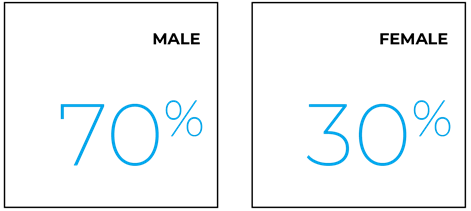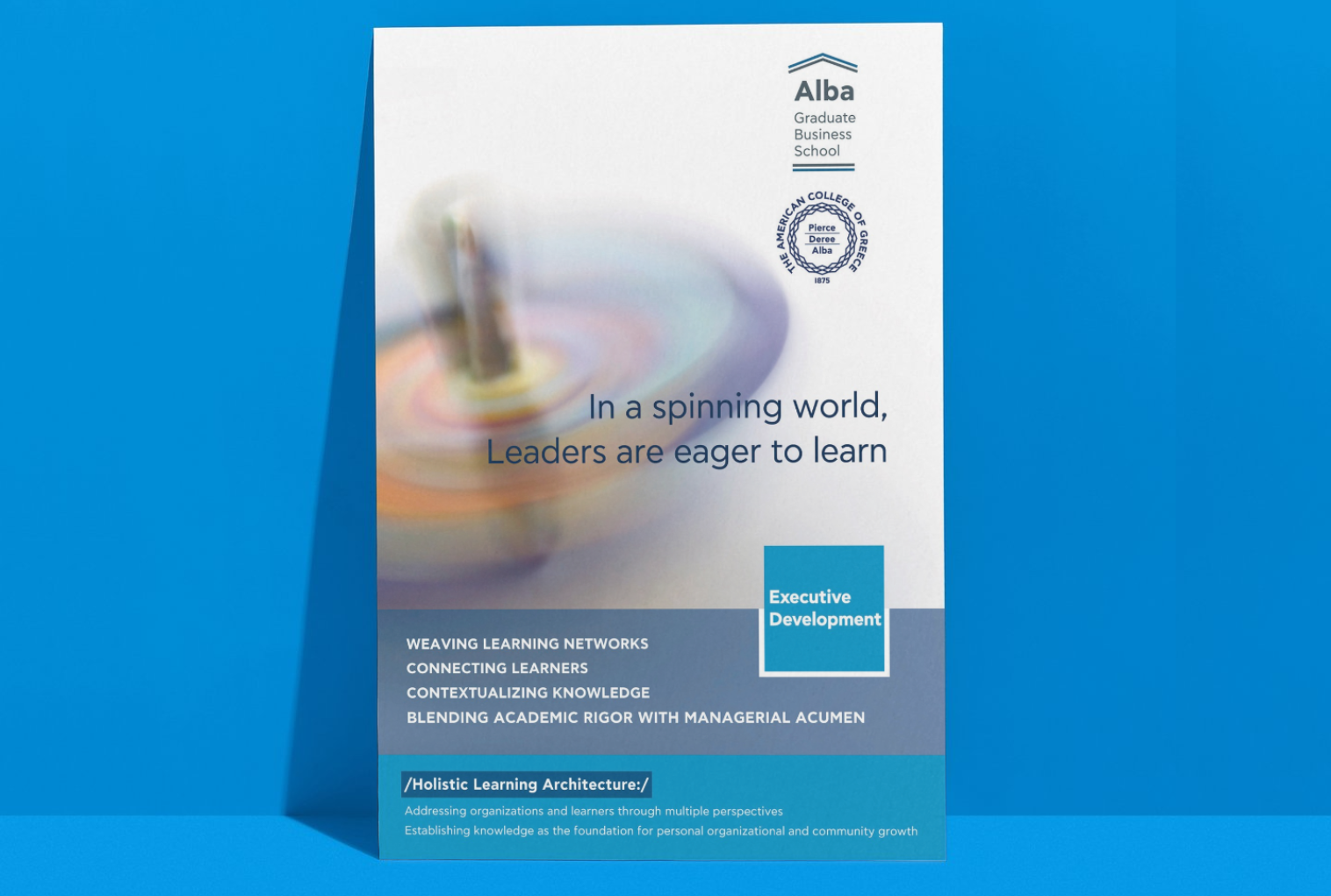The Alba MBA with Shipping
SEA...YOUR FUTUREOVERVIEW
A stream of the Alba MBA program, the Alba MBA with Shipping has been designed in collaboration with the Greek shipping community, the "Business Advisory Committee" for the Shipping programs of Alba to meet the industry’s educational needs.
The Alba MBA with Shipping stream prepares aspiring and seasoned shipping professionals for a future full of challenges in the shipping industry. The program, provides significant networking opportunities along with a challenging and unique educational experience delivered by world-renowned academics and distinguished industry practitioners in the field. Apart from specialized shipping courses and workshops, the MBA with Shipping program invests heavily in leadership and strategic management competencies, which are particularly relevant both as personal advantages and as essential resources for companies in this sector.
Key features of the program
- Evening Classes with easy access to the school: near metro stations; Weekday classes between 18:00 - 22:00.
- Flexible schedule to accommodate the needs of professionals: 12-month program (24-month program for part-time mode).
- Wide range of courses that address the latest developments in Business and shipping.
- A variety of assessments to enhance the analytical and practical skills of students: Group reports/presentations, real case study analysis, a Shipping Consulting Project, mid-term tests, final exams, peer evaluation reports, self-reflection papers.
- Capstone course offered by the Entrepreneurship Boot Camp (EBC) that provides a synthesis of all intended learning outcomes of the Alba MBA with shipping program in a single project that combines creativity innovation and implementation of new business ideas in an entrepreneurship/intrapreneurship setting.
The MBA with Shipping is designed particularly for:
- Highly motivated professionals with at least 3 years of solid working experience and a clear aim to advance their career in management positions in the broader maritime industry.
- Members of family shipping businesses with at least 3 years of solid working experience preparing to take on increasing responsibility in their companies.
- Officers of the Merchant Marine (Master or Chief Engineer) serving both at sea & onshore.
You may find here more information about the Program's Intended Learning Outcomes.
Current Student Profile


HIGHLIGHTS
Ideal Location: Offered in Greece, a country with long-standing tradition in shipping.
Highly-Accessible World-Renowned Faculty : Teaching (resident & visiting faculty) combines research-lead and technically advanced methods and is delivered by world renowned academics providing a challenging and eye-opening educational experience.
Leadership Development: The Alba MBA with Shipping is a living experience that inspires students to act as leaders by offering them actionable knowledge and skills which they can apply directly to their current positions. Through classroom teaching and personal coaching, students embark on a journey of self-awareness and personal development, identifying strengths and areas of improvement and putting their aspirations into a coherent and dynamic learning plan for the future.
International Recognition: Being accredited by AMBA (the Association of MBAs, the highest standard earned only by the top 3% of MBAs globally) and the prestigious US-based a New England Commission of Higher Education (NECHE), the Alba MBA with Shipping has international credibility and status and enables access to networking opportunities to graduates of other accredited MBAs.
Moreover, the MBA with Shipping is accredited by the Institute of Chartered Shipbrokers (ICS), the only internationally recognized professional body in the commercial maritime arena. Graduates of the program are eligible for three exemptions from the ICS qualification.
Member of BIMCO, the world’s largest direct-membership organization for shipowners, charterers, shipbrokers and agents. All Alba shipping students have access to BIMCO, an organization that brings shipping people together to work for shared goals, and receive discounts on several BIMCO products.

Links to the Industry and Support: Strongly supported by the Greek shipping community: significant networking opportunities and participation in activities such as educational field trips abroad/cruise trips, visits to shipping companies, ports and commercial vessels. ALBA is a not-for-profit educational association of 89 Greek corporations including leading shipping companies like, Arcadia, Navios, Paragon, Star Bulk, Thenamaris and Top Ships.
Moreover Alba shipping programs are supported by WISTA Hellas, The Hellenic Shipbrokers Association (HSA), The International Propeller Club (Piraeus), the Master's and Mates Union of the Greek Merchant Marine, the International Community for Maritime and Ocean Professionals (SNAME) and the Green Award, offering several partial scholarships and financial aid.

ADVISORY BOARD
THE PROGRAM COMMITTEES
The MBAwith Shipping Business Advisory Committee (BAC) comprises of a select group of professionals from Greece and abroad and ensures the practical aspects of the program and that the program’s content is in line with the most recent developments in the shipping industry.
The BAC consists of:
George Achniotis, CFO NAVIOS MARITIME HOLDINGS
Stamatis Bourboulis, General Manager - EURONAV Ship Management (Hellas) Ltd
Anna Bredima, Senior Policy Advisor on European Affairs/ Cyprus Union of Shipowners
Kostas Kanellopoulos, Managing Director NEREUS SHIPPING S.A.
George Karageorgiou, President/CEO OLYMPIC SHIPPING AND MANAGEMENT S.A.
John Kokarakis, Vice President Technology and Business Development BUREAU VERITAS
Dimitrios Mattheou, CEO at Arcadia Shipmanagement Co Ltd. & Aegean Bulk Co Inc. | Chairman at Green Award Foundation Greece.
Vassilis Papageorgiou, Vice Chairman TSAKOS Group (1st deputy: Venetia Kallipolitou TSAKOS Group Maritime Training and Education Advisor, 2nd deputy: Ioannis Glykis Operations Marine Manager TSAKOS Columbia Shipmanagement).
Dimitris Patrikios, CEO, KYKLADES MARITIME CORPORATION
John Platsidakis, Honorary Chairman INTERCARGO.
Helen Polychronopoulou, President of HEMEXPO
Iraklis Prokopakis, Senior Vice President, Treasurer and Chief Operating Officer DANAOS
George Skrimizeas, CEO, NORTUS INVESTMENT
Stratos Tsalamanios, Co-CEO MYLAKI SHIPPING AGENCY LTD and SEAVEN TANKER & DRY MANAGEMENT INC.
Stamatis Tsantanis, CEO, SEANERGY Maritime Holdings Corp.
Kostas Vlachos, Director of Technical ZODIAC Maritime.
Panos Zachariadis, Technical Director ATLANTIC BULK CARRIERS MANAGEMENT LTD
Ioannis Zafirakis, Director, Chief Financial Officer, Chief Strategy Officer , Treasurer and Secretary at Diana Shipping Inc.
The MBA with Shipping program is designed with the support of an international group of renowned academics that consists the Academic Advisory Committee (AAC) of the program.
The AAC consists of:
Kevin Cullinane - Professor of Marine Transport & Management, School of Marine Science & Technology, University of Newcastle, UK.
Ernst Frankel - Professor of Ocean Engineering, Emeritus, School of Engineering, Massachusetts Institute of Technology (MIT), USA.
Trevor Heaver - Professor Emeritus, Centre for Transportation Studies, University of British Columbia, Canada.
Anastasios Perakis - Associate Professor, SNAME Fellow, Office of Naval Research Distinguished Faculty Fellow, The Boeing Co Welliver Faculty Fellow, Department of Naval Architecture & Marine Engineering, College of Engineering, University of Michigan, USA.
Siri Pettersen Strandenes - Professor, Centre for International Economics and Shipping, Norwegian School of Economics and Business Administration, Norway.
FULL TIME
Total Year Schedule 2025 -2026 (Full time mode)
Total US Credits: 36
The school reserves the right to reexamine the structure of all academic programs and proceed to any necessary changes in the total year schedules.
You may find the Graduate Academic Calendar 2025–26 here.
1st Period | Fall 2025
Creativity & Innovation
2
Creativity and innovation are career and business imperatives in the fluid and highly competitive economy of the 21st century. The explosion of creative industries in recent decades have turned innovation into a critical success factor in any form of work that involves the imagination, aesthetics, emotion, invention, or/and problem solving. With the advent of the knowledge economy, creativity has also become a cardinal aspect of managerial jobs. Creative problem solving, creative responses to contextual variability, improvisation, and the ability to generate original and bold ideas are defining elements of career success. This course provides students with the knowledge, skills and insights for discovering and practicing creativity in organizations, groups, and one's own career. The fourfold structure of the course entails: (a) cutting-edge knowledge about such topics as developing creative capabilities, managing creative people, crafting creative work environments, and turning creative ideas into winning innovations; (b) concrete insight on practice through over 100 mini cases, examples and illustrations of creative accomplishment and innovation in business and society; (c) valuable "insider insight" about selected creative industries through direct interaction with guest speakers of notable creative achievement; and (d) practical application and the opportunity to act creatively during the course through brief interactive exercises and a major creative group assignment.
Economics for Global and Digital Markets
2
This course concentrates on the economic fundamentals of management by developing tools and thinking frameworks to analyze the structure and the evolution of the industry and the macroeconomic environment of a company. The course employs classical economic as well as game theoretic methodology to study the operation of markets in allocating resources as well as the markets’ impact on managerial decision making. Topics under consideration include consumer and business behavior, their interaction in competitive and non-competitive markets, the impact of market structure in the company’s managerial decision making and strategies, and the economics of platforms. Furthermore, the course develops thinking frameworks and methods to help participants understand the macroeconomic environment within which businesses operate, and also to identify channels through which this environment influences their managerial decision making.
Quantitative Methods for Business Decisions
2
This course aims to enhance your quantitative and problem structuring skills, with emphasis placed on the process of action-oriented decision making. It also aims to equip you with specific skills in the areas of data analysis, risk evaluation, project evaluation and forecasting. You will be exposed to advanced decision support tools and you are expected to reach "end-user" level of modelling competence. This means that you should be in a position to deal with messy real-life problems that require some action, recognize the areas where business analysis can add value, select appropriate types of analyses and tools and apply them in order to make informed decision.
Financial Reporting and Analysis
2
The course explores the ‘art’ of financial accounting / financial reporting. In particular, the goal of the course is to provide the knowledge and skills required for the understanding and use of financial accounting information for decision making. Some of the topics covered during the course include: the role and importance of financial reporting, the role of the main players in the accounting communication process, including the management, auditors and stakeholders, the effects of the use of different accounting methods and estimates on the financial statements and the subsequent impact on decision making, ways of analysing, interpreting and evaluating financial statements. During the course, extensive reference is made to the annual reports of various companies, as well as to accounting scandals (e.g. ENRON), for the facilitation of knowledge and understanding.
Maritime Business and Finance
2
Seaborne transportation is a crucial catalyst for world trade and economic growth. Globalization, increased competition and rapid technological changes have resulted in lower transportation costs, making shipping even more relevant and important for today’s global economy. The shipping industry however is characterized by its cyclicality and capital intensiveness and as a result, stakeholders need to adopt a prudent and diligent approach. This course exposes you to the industry’s macroeconomic and microeconomic forces, the economic and regulatory environment whilst it also analyzes different capital sources that can be employed by shipping companies in order to diversify their capital structure and maximize shareholders value. Real-life case studies are being used throughout the course, enhancing your practical understanding of key shipping and ship-financing concepts and structures.
Business Communication Skills
2
The purpose of this course is to build critical reading, writing and presentation skills to enable participants communicate effectively. After completing this course, its participants will be able to prepare different types of documents, searching and evaluating evidence adopting a critical approach in reading and writing. Moreover, this course provides students with the presentation skills to build presence, authority, and a newfound ability to captivate the audience. They will empower the content and their stage presence by discovering different presentation styles but most importantly identifying their own. A special feature of this course is that participants will have the opportunity to experience the tools presented through an interactive methodology.
Business Integration
2
In teams, students will compete for profit and market share in a virtual muesli industry, over several business cycles. Students will manage raw materials, production, marketing, sales, accounting and competitive strategy. They will produce financial statements and other management reports that will help them improve their decisions and business performance over the following business cycles. In other words, during this simulation game, students will experience end-to-end management: from inbound logistics to sales, and from low level operations to executive decision making. The main objective of the course is to demonstrate how businesses can achieve integration and control via well defined processes and information systems. How seamless and reliable access to real time information provides end-to-end visibility to critical business operations and supports continuous improvement. Another objective of the course is to recapitulate all the core MBA subjects through an integrative and applied experience. This simulation game is an intensive, actionable and tremendously fun learning experience aimed at consolidating some critical skills of the MBA curriculum. The game is based on a special version of the SAP ERP software, developed at HEC Montreal and supported by SAP AG. During the course, the necessary training will be provided on the following modules: materials management, production planning, sales and distribution, financial accounting, cost accounting, and business intelligence.
Team Building
-
The aim of the workshop is to provide participants with a fulfilling and lively event, in order to introduce them to the importance of teamwork. By taking part in planned outdoor activities and exercises and through mutual support, the team enables itself to overcome difficulties and built strong bonds. Furthermore, this process will result into the formation of the groups that participants are going to work with during their studies.
2nd Period | Winter 2026
People & Organizations
2
The course provides an overview of the core areas of organizational theory and organizational behavior with a special emphasis on topics related to organizational structures, culture and values, employee motivation, teamwork, and the management of change in organizations. It will help participants understand the complex relations between individuals, organizations, and the external environment. Particular emphasis is placed on the effective functioning of organizations in dynamic environments, where strategic and operational agility have emerged as essential capabilities for organizations to survive and prosper. Through case studies, videos, discussion, and a simulation game, students will have the opportunity to exercise their critical thinking and develop management skills by applying related concepts and theories to a broad range of challenges relevant to the everyday life in organizations.
Maritime Law
2
The course enables students to understand the basic concepts of the law relating to shipping, so as to bolster their prospects of professional, commercial or business employment. Notions such as the ship, admiralty jurisdiction, arrest, ship mortgage, maritime lien, marine insurance shall be examined and analysed. Furthermore, it is opted to enhance students’ interpretational skills when examining legal instruments. Finally, students are expected to develop other skills, such as problem solving, legal research, independent study and critical evaluation. Successful students shall demonstrate a satisfactory knowledge of various concepts of shipping law. They should be in a position to apply the relevant law to hypothetical problems, to evaluate critically legal situations and reach reasoned conclusions.
Ship Technology
2
The course outlines general ship characteristics as well as the statutory and commercial rules and guidelines associated with the design and operational profile of ship types. Statutory and class regulations are presented in association to the flag and design criteria related to safe construction of ships. Furthermore, most common ship types and their commercial characteristics are presented. Guidelines associated with the design and operational profile of ship types are mentioned. Technical and vessel voyage elements are presented analytically, with reference to individual vessel types and operation. Ship repair Management and the principles of ship valuation are discussed and analyzed in the class.
Leadership
2
Management consists of a set of universal skills that are well understood and trainable. Leadership consists of how each one of us makes a unique difference to the challenges we face with people and projects. It is not about wasting our energy trying to make ourselves more effective by changing our characters. Instead, it is more effective to find new and better ways of ‘being ourselves’ through enhanced insight and skill. The purpose of this course is twofold: (a) to assess and improve your readiness to function well as a leader by making your time at Alba Graduate Business School a self-directed journey of learning and development; the specific objectives are to develop an awareness of the knowledge and skills that underlie leadership effectiveness; to obtain individual-level feedback utilizing some of the best existing assessment instruments; to share feedback on your own and others’ skills; and to craft a personal leadership development action plan; (b) to help you acquire actionable knowledge about leadership styles, leading with power, and influence processes by exposing you to both classical perspectives on and contemporary trends in leadership theory and practice through a series of stimulating readings, discussions, exercises, and case studies.
Production & Operations Management
2
Production and Operations management can be defined broadly as the process steps that fulfil the production and delivery of “goods”, where “goods” include both material products and intangible services that offer some utility to the end consumer and the overall process subsumes all stages required to transform a product from a rough idea in a brainstorming meeting to the end customer offering. This course focuses on managerial decisions in production and operations and their interrelationships with the other functional areas of the firm. Major areas of study include the design of productive systems, strategic planning, and operations planning and control. Specific topics cover the areas of process and job design, facility planning, capacity planning, distribution planning, inventory management and production planning and control.
Marine Insurance & Carriage of Goods by Sea
2
The first part of the course is to introduce students to the issues involved in insuring the various interests that may arise in vessels and their cargoes. The course examines the types of policy available, the legal issues that arise in the placement and claims processes and the risks covered by the standard form of marine insurance wordings available. The second part of the course is to provide the principles of law governing the carriage of goods by sea and admiralty jurisdiction. It further focuses on liability in terms of the cargo transported and claim implications. The aim of the course is to enable students to understand, analyse and critically evaluate the processes which affect a shipping company in relation to marine insurance issues and to the law of carriage of goods by sea.
3rd Period | Spring 2026
Entrepreneurship: The bootcamp experience
2
The Entrepreneurship bootcamp experience course has been designed to offer cutting-edge knowledge, hands-on experience and practical skills to MBA students who aspire to get a good grasp of the world of startups and plan new ventures. Students form teams and gradually develop unique business ideas in a highly interactive and practice-based learning journey. Within a period of two months students learn how to discover, assess, fund and pitch business ideas. In this process, students are exposed to novel frameworks and up-to-date learning tools (e.g., Business Model Canvas, Lean startup methodology, Minimum viable product, Financial feasibility testing, among others). The learning experience is designed by Alba resident faculty and curated by Alba academics and Venture Capital professionals, who coach, mentor and guide students throughout their learning journey. A panel of leading practitioners and academics evaluates presentations of business plans during the annual Alba Business Plan contest. The winning team represents Alba at i) the European Business Plan of the Year competition and ii) Stage Two, a pan-European start-up competition held under the patronage of EU-Commission.
Shipping Consulting Project
2
The Shipping Field Consulting Project is a unique learning experience and a cornerstone of ALBA's educational philosophy. It is the culmination of a year's intensive learning, and the time to elaborate on and implement concepts and methods in a real, corporate environment. Teams of students have the unique opportunity to test "in the field" what they have learned in class. Teams spend approximately three months working on a practical corporate project, supervised by a faculty member. They are required to systematically proceed to problem-solving, following the pattern analysis-diagnosis-proposal of solutions. The final report is presented to both company representatives who commissioned the project and the School's faculty.
Business Ethics and Sustainability
2
The overall objective of the course is to help us develop business and financial ethics leadership praxis and actionable knowledge, i.e., action that creates wealth in such a way that makes ourselves, our organizations, and the world better. This course takes a management methods approach to business and financial ethics and social responsibility. The course focuses on methods managers can use individually and together in addressing ethics and social responsibility issues and in helping to build and maintain ethical and socially responsible organizations in various types of environments and realities. Methods considered include ethics leadership, change, reasoning, dialogue, persuasion, governance, due process, negotiating, incentive, training, social movement, alternative institution building, top-down and bottom-up compliance code and win-lose forcing methods, and ethics crisis management and turnaround methods. In addition to learning about the methods, students are invited to reflect upon what types of institutional citizens we would like to be and what types of ethical and socially responsible organizations we would like to help create in our various types of environments and realities. Case studies from Europe, Asia, and North America are considered.
Ship Chartering & Charter Party Analysis
2
The aim of this course is to provide in-depth and holistic understanding of charter markets, chartering practice and charter party analysis in dry cargo and tanker shipping. Content includes the procedures and practices in chartering merchant ships in the dry cargo and tanker markets, their commercial employment under various forms of chartering and the detailed calculation of financial (freight) performance, voyage planning and lay time estimations. The module provides an in-depth analysis of charter party forms and adopts a legal and commercial perspective to analyze significant clauses and to explain various specialized terms in dry cargo and chartering contracts. The market structure of dry cargo and tanker industries are also analyzed and an overview of the practitioners involved (brokers, owners, charterers) is provided as are the sources of data and information required to initiate, negotiate, agree, execute and assess a successful charter party contract in the dry bulk and tanker markets.
Strategic Management for Shipping Services
2
The effective and daily strategic management of companies operating in the shipping service sector is of the most paramount importance. Managers, thus, are in need of strategic making skills as ever. Strategy is the set of objectives and policies that set to define how a shipping service provider positions itself to gain competitive advantage and increase returns for its owner and stakeholders. Two questions are of importance, then: “What business should we participate in” and “How should we compete?” In answering these questions, the external environment and the internal company resources and capabilities take a central role. Through case studies and assignments, participants learn to use tools for analyzing, creating and, communicating strategies in the shipping industry.
PART TIME
Total Year Schedule 2025 -2027 (Part time mode)
Total US Credits: 36
The school reserves the right to reexamine the structure of all academic programs and proceed to any necessary changes in the total year schedules.
You may find the Graduate Academic Calendar 2025–26 here.
1st Period | Fall 2025
Economics for Global and Digital Markets
2
Quantitative Methods for Business Decisions
2
Financial Reporting and Analysis
2
Business Communication Skills
2
Team Building
-
2nd Period | Winter 2026
People & Organizations
2
Maritime Law
2
Production & Operations Management
2
Marine Insurance & Carriage of Goods by Sea
2
3rd Period | Spring 2026
Ship Chartering & Charter Party Analysis
2
4th Period | Fall 2026
Creativity & Innovation
2
Maritime Business and Finance
2
Business Integration
2
5th Period | Winter 2027
Ship Technology
2
Leadership
2
6th Period | Spring 2027
Entrepreneurship: The bootcamp experience
2
Business Ethics and Sustainability
2
Shipping Consulting Project
2
Strategic Management for Shipping Services
2
FACULTY
CAREER
Another important aspect of the Alba MBA with Shipping is that the program itself does not operate in isolation as a closed system of business education, but as part of a wider learning ecosystem that develops on the network around Alba that connects students with academia, faculty, industry experts, companies, technology, communities, societies and global markets.
The Career and Alumni Office plays a major role in this: it offers tailored career consulting and networking solutions specifically to MBA students in order to assist them in their personal development and career advancement. The Office makes a point of offering MBA students stimuli that address their needs and wants, such as bringing alumni in the classroom in various ways, so that they become a vital part of students’ life experience during and after their studies at Alba.
Our vision for our graduates
- Subject experts capable of managing a company end-to-end namely from human capital management to operations and financials.
- Entrepreneurs and intrapreneurs that will lead new business formation functioning in a high performance team context.
- Creative teamplayers with the skills and stimuli for discovering and practicing creativity in organizations, groups and their own personal pursuits.
- Mindful business leaders with confidence, authenticity, civility and practical wisdom (phronesis).
SCHOLARSHIPS
You can secure pre-approval of your scholarship, before you apply for admission to the MBA or MSc program of your choice.
GMAT Scholarships
Scholarships of 40% for MBAs and MSc programs for GMAT ≥ 645
International Propeller Club Piraeus
One (1) full scholarship for MSc in Shipping Management and two (2) partial scholarships for the MBA with Shipping.
WISTA Hellas "Women in Shipping Scholarship Series"
One (1) full 100% scholarship for the MBA with Shipping to women working in the maritime sector.
ADMISSION REQUIREMENTS
To be considered for admission, candidates must:
- Hold a bachelor degree - Provide evidence of excellent command of the English language;
- A minimum of three years of professional work experience, obtained after the completion of the bachelor degree, is a prerequisite for the ALBA MBA with Shipping program (military service not included for Greek male applicants);
- Need to be currently employed or self-employed (valid for the part time mode only)
- GMAT (Focus Edition) test is optional unless the Academic Committee requires the applicant to take it: in any case, scores of 515 or more (GRE >155) can strengthen your application and help you secure a scholarship.
Candidates must submit:
- The completed application form, including one recent photograph in jpeg format;
- Two letters of recommendation, in Greek or in English language;
- Official academic transcripts as well as certified copies of degrees from each undergraduate, graduate or professional degree earned;
- Proof of competence in the English language (unless schooled in English): Proficiency (Cambridge Proficiency, Michigan Proficiency, MSU Proficiency), or TOEFL, or IELTS, or Duolingo English Test;
- Three essays, as indicated in the Application form;
- Receipt of the non-refundable application fee's [€60] deposit.
Click here to download the details for admission.
For details on academic policy, course credit policy, fees policy, and rules for student conduct, please refer to the Student Handbook
Additionally, the School's Students Code of Conduct can be found here
REQUEST A BROCHURE
Fill in this form for a copy of the brochure
CONTACT

Spyros Vougious serves as the Director overseeing all Alba Shipping Programs and is renowned as the founder of the highly successful MSc in Shipping Management program, which has been running since 2013. His expertise lies in designing, managing, and executing academic programs in the shipping field, both at the undergraduate and graduate levels. He has established strong collaborations with British and other foreign universities in this pursuit. Spyros, possesses strong connections within the Greek shipping industry and holds the responsibility of overseeing the Shipping Business Advisory Committee at Alba. Moreover, he has arranged numerous educational field trips overseas and has twice hosted the International Maritime Statistics Forum in Greece.

We urge applicants to request further information or to come for a meeting at our downtown campus, in order to better understand their profile and motivations.
Just fill out and submit the form below and we will respond to you as quickly as possible.
Tel.: +30 210 89.64.531 ext. 2269
e-mail: [email protected]



















